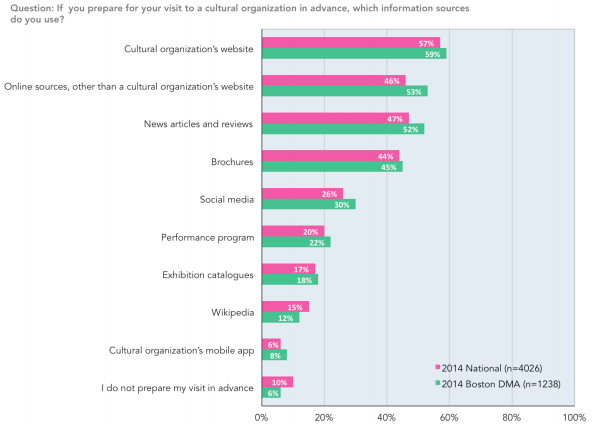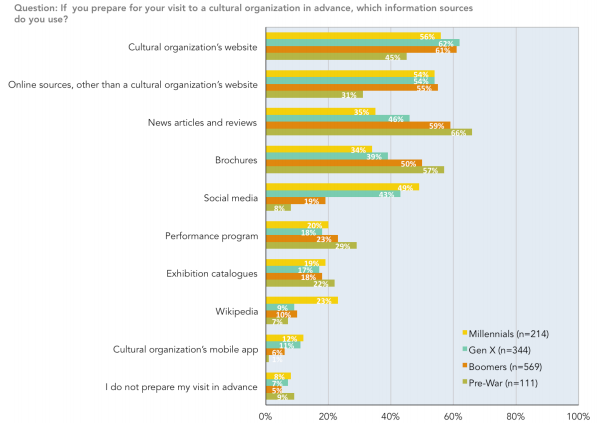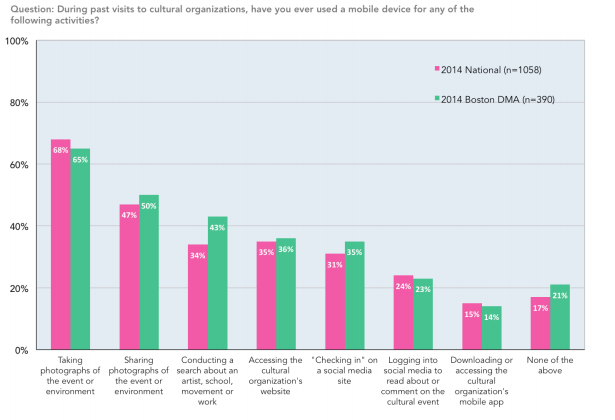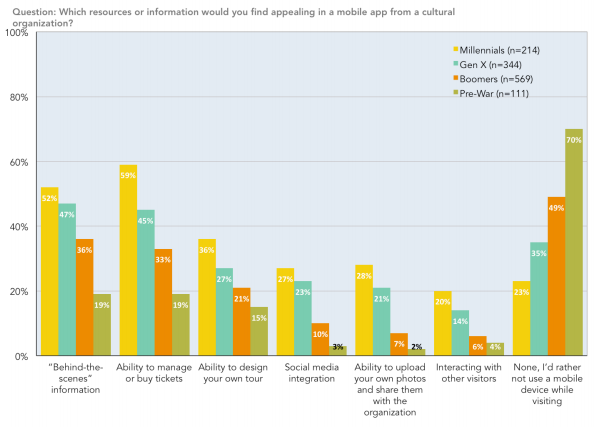There are probably just a handful of cultural authorities in Boston apt enough to weigh in with commentary and constructive criticism when it comes to Bostonians’ artistic tendencies. The Museum of Fine Arts, Boston is one of, if not the single most preeminent institutions of enlightenment in the city, and therefore the perfect establishment to have published the study Culture Track 2014: Focus on Boston.
The report was commissioned by the MFA and developed by the advertising and design firm LaPlaca Cohen in tandem with research design firm Campbell Rinker. The objective was to gather data, explore insights and determine characteristics specific to Boston’s culture crowd – those who actively and often attend performances, enjoy museums and take part in applicable exhibits and activities.
“This study—commissioned by the MFA—gets inside Boston’s unique cultural mindset, which is deeply informed, engaged and unique. We expect that it will help as we build and diversify our audiences in the future,” said Malcolm Rogers, Ann and Graham Gund Director at the MFA, in a statement. “It’s a privilege for us to share the findings with Boston’s cultural community.”
It turns out that Millennials are the second least likely to check an organization’s website for information about its programming beforehand.
The firms surveyed 1,238 Bostonians and ran the gamut on topics including everything from demographics to attendance to media usage. Comparing those statistics to the data generated by the 4,026 respondents representing all 50 states in order to round out the study, the surveyors were able to determine that Bostonians are more culturally engaged, more curious, more informed and more open to new cultural experiences.
But what’s perhaps most intriguing about the study’s findings is the role it deduced technology plays on how we engage with culture and experience it overall.
Great Boston, of course, is a tech savvy region in its own right so it’s not particularly groundbreaking that certain innovations have seeped into many facets of our daily lives. Cultural exhibits, too, given their prestige and unsullied aura, may appear in many cases almost immune to next-gen technologies.
When considering social media, however, millennials own it. Almost half, 49 percent, of Millennials will prowl social media before taking in an event
This, as it turns out, is not the case and technology’s influence on how culture is experienced is apparent and significant, especially for younger generations.
According to the data, 59 percent of Bostonians prepare for a cultural experience by first checking the organization’s website, compared to 57 percent of people surveyed nationally. Fifty-three percent of Bostonians check other online sources, not the organization’s website, but just 46 percent of non-Bay Staters do, too.
Similarly, 30 percent of Bostonians head to social media beforehand, whereas just 26 percent of the nation does so as well.
Breaking it down by generation, it turns out that Millennials are the second least likely to check an organization’s website for information about its programming beforehand. Sixty-two percent of Generation X people (pre-Baby Boomers) head to the website first, followed by 63 percent of Baby Boomers and then 56 percent of millennials. The Pre-war generation, naturally, is least likely to jump online.


When considering social media, however, millennials own it: Almost half, 49 percent, of Millennials will prowl social media before taking in an event compared to just 43 percent of Generation X, as well as 19 percent of Baby Boomers and just 8 percent of Pre-war.
Bostonians in general are also more inclined to using a mobile device when on-site at an exhibit or showcase. Though 24 percent of Bostonians are likely to engage with their smartphone during an event compared to just 20 percent of the rest of those surveyed, 65 percent of Bostonians are likely to take a photo during it while 68 percent of the rest is likely to.
But Bostonians are a social breed, and 50 percent of respondents contend they’ve shared a photo during an event while just 47 percent of everyone else has done the same.


Despite our collective affinity for using tech to enhance our cultural experience, Bostonians don’t consider many forms of tech-fueled media as culture.
For example, just 16 percent of Bostonians consider podcasts to be an art form. Similarly, just 15 percent think catching a blockbuster flick at home is considered a cultural activity; 12 percent think the same of listening to commercial radio, though 47 percent think public radio counts as art, compared to just 36 percent of the rest of the country.
Though the findings of the study may seem common sensical in several respects – especially given the fact that younger generations grew up on contemporary technologies and therefore are more likely to employ them to enhance how they experience culture – it’s interesting, too, that it’s a growing trend.
I’ve noticed first-hand how much people will check their mobile devices when meandering through museums with works that warrant one’s full attention, but I’ve always thought it was completely unrelated to the art at hand.
Rather, though, they could be simply trying to digest as much information as they can, meaning that they’re perhaps more engaged and more interested and more willing to learn about a certain artifact or work then those who do not.
What do you think, Boston? Do you deliberately use technology to get the most out of culture? Or do you resent those constantly checking their device when there’s artistic beauty at hand? Let us know your thoughts and tendencies in the comments section below.
Featured image via Nick DeLuca

